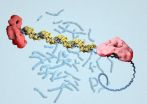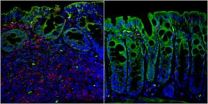(Press-News.org) New research confirms that sleep disturbances are linked to pain and depression, but not disability, among patients with osteoarthritis (OA). Study results published in Arthritis Care & Research, a journal of the American College of Rheumatology (ACR), found that poor sleep increases depression and disability, but does not worsen pain over time.
Arthritis is one of the top three health concerns that cause disability in the U.S., with OA being the most common form of arthritis. Medical evidence reports that nearly 30 million Americans are affected by OA, which has increased healthcare costs by $186 billion between 1996 and 2005. Previous studies show that those with knee OA report issues with initiating sleep (31%), difficulty maintaining sleep at night (81%), and general sleep problems (77%).
"Sleep disturbance is a common complaint among those with pain, particularly among those with OA," explains Dr. Patricia Parmelee from the Center for Mental Health & Aging at The University of Alabama in Tuscaloosa. "Our research is unique as we investigate the complex relationships among sleep, OA-related pain, disability and depressed mood simultaneously in a single study."
For the present study 288 patients with knee OA provided information on sleep disturbances, pain, functional limitations, and depressive symptoms. Researchers recruited participants from diverse settings to gather a broad representation of OA subjects. Sleep disturbances at the start of the study were used to predict changes in pain, disability and depression after a one-year period.
Findings indicate that sleep was independently associated with pain and depression at baseline. Disability was not linked to baseline sleep disturbances. In individuals with high pain levels, the combination of poor sleep and pain exacerbated depression. Sleep disturbance at baseline predicted increased depression and disability, but not pain at one-year follow-up.
Dr. Parmelee adds, "This study shows that depression plays a strong role in the sleep-pain connection, particularly with severe pain. Further investigation of sleep in disability progression may lead to new interventions that disrupt the cycle of OA distress."
INFORMATION:
This study is published in Arthritis Care & Research. Media wishing to receive a PDF of this article may contact sciencenewsroom@wiley.com.
Full citation: "Sleep Disturbance in Osteoarthritis: Linkages with Pain, Disability and Depressive Symptoms." Patricia A. Parmelee, Caitlan A. Tighe and Natalie D. Dautovich. Arthritis Care and Research; Published Online: October 6, 2014 (DOI: 10.1002/acr.22459).
URL Upon Publication: http://doi.wiley.com/10.1002/acr.22459
Author Contact: To arrange an interview with Dr. Parmelee, please contact David Miller with the University of Alabama at dcmiller2@ur.ua.edu.
Media Advisory
2014 ACR/ARHP Annual Meeting Press Registration Now Open.
What: Registration is now open to journalists planning to attend the 2014 ACR/ARHP Annual Meeting in Boston.
Thousands of rheumatologists and rheumatology health professionals are expected to attend this year's meeting, which will highlight the latest advances in rheumatology research.
Where: Boston Convention Center; Boston, Mass.
When: November 15-19, 2014
Online Registration: To register for a press badge click here
Policies: Please make sure to review our press guidelines http://www.acrannualmeeting.org/Press as they may impact your ability to receive press credentials
Dates for this year's annual meeting:
Press registration closes: Monday, November 3
Press conference schedule announced: Early-October
On-site Newsroom opens: Saturday, November 15; 7:30 AM ET
Opening Lecture/Embargo lifts: Saturday, November 15; 4:30 PM ET
http://www.acrannualmeeting.org/Press or contact Bonny Senkbeil at (404) 633-3777 or via e-mail at bsenkbeil@rheumatology.org, 404-633-3777
About the Journal
Arthritis Care & Research is an official journal of the American College of Rheumatology (ACR), and the Association of Rheumatology Health Professionals (ARHP), a division of the College. Arthritis Care & Research is a peer-reviewed journal that publishes both original research and review articles that promote excellence in the clinical practice of rheumatology. Relevant to the care of individuals with arthritis and related disorders, major topics are evidence-based practice studies, clinical problems, practice guidelines, health care economics, health care policy, educational, social, and public health issues, and future trends in rheumatology practice. The journal is published by Wiley on behalf of the ACR. For more information, please visit the journal home page at http://wileyonlinelibrary.com/journal/acr.
About Wiley
Wiley is a global provider of content-enabled solutions that improve outcomes in research, education, and professional practice. Our core businesses produce scientific, technical, medical, and scholarly journals, reference works, books, database services, and advertising; professional books, subscription products, certification and training services and online applications; and education content and services including integrated online teaching and learning resources for undergraduate and graduate students and lifelong learners.
Founded in 1807, John Wiley & Sons, Inc. (NYSE: JWa, JWb), has been a valued source of information and understanding for more than 200 years, helping people around the world meet their needs and fulfill their aspirations. Wiley and its acquired companies have published the works of more than 450 Nobel laureates in all categories: Literature, Economics, Physiology or Medicine, Physics, Chemistry, and Peace. Wiley's global headquarters are located in Hoboken, New Jersey, with operations in the U.S., Europe, Asia, Canada, and Australia. The Company's website can be accessed at http://www.wiley.com.
PROVIDENCE, R.I. [Brown University] — Within our fat lives a variety of cells with the potential to become bone, cartilage, or more fat if properly prompted. This makes adipose tissue, in theory, a readily available reservoir for regenerative therapies such as bone healing if doctors can get enough of those cells and compel them to produce bone.
In a new study in the journal Stem Cell Research & Therapy, scientists at Brown University demonstrate a new method for extracting a wide variety of potential bone-producing cells from human fat. They developed a fluorescent tag ...
An innovative patient management system at the acute stroke unit of Kelowna (BC) General Hospital has reduced the number of stroke patient bed days by more than 25 per cent, according to a study of the system presented at the annual Canadian Stroke Congress in Vancouver.
In total, it is estimated the new system is saving the 380-bed hospital more than 1,000 bed days per year. This represents annual savings of up to $800,000, all achieved without the need for any new investment in devices, treatments or personnel.
"It's a win-win situation," says Dr. John B. Falconer, ...
At the first sign of a stroke, time is of the essence. For every minute of delay in treatment, people typically lose almost two million brain cells. Yet a new study presented at the Canadian Stroke Congress reveals that those delays – in getting the right tests and the right drugs – can be longer when people experience a stroke in a hospital.
Investigators from the University of Toronto Faculty of Medicine, the Institute for Clinical Evaluative Sciences (ICES) and the University Health Network looked at data from acute care facilities in Ontario over nine years. They ...
Researchers at the University of Texas Medical Branch at Galveston say that sexting may be the new "normal" part of adolescent sexual development and is not strictly limited to at-risk teens. The findings, published in the journal Pediatrics, are from the first study on the relationship between teenage sexting, or sending sexually explicit images to another electronically, and future sexual activity.
The study results indicate that sexting may precede sexual intercourse in some cases and further cements the idea that sexting behavior is a credible sign of teenage sexual ...
We might love to reminisce and tell others about our extraordinary experiences — that time we climbed Mt. Kilimanjaro, got to taste a rare wine, or ran into a celebrity on the street — but new research suggests that sharing these extraordinary experiences may come at a social cost. The findings are published in Psychological Science, a journal of the Association for Psychological Science.
"Extraordinary experiences are pleasurable in the moment but can leave us socially worse off in the long run," says psychological scientist and study author Gus Cooney of Harvard University. ...
Children's future writing difficulties can be identified before they even learn how to begin writing, according to a new study by Professor Phaedra Royle and Postdoctoral fellow Alexandra Marquis of the University of Montreal's School of Speech Language Pathology and Audiology. The researchers are interested in oral language skills and their impact on grammar and spelling learning. Their work shows that oral language is a good predictor of writing difficulties. "The more children are able to use verb tense in spoken language, the more easily they can learn written language," ...
Researchers from UCL, Stanford Engineering, Google, Chalmers and Mozilla Research have built a new system that protects Internet users' privacy whilst increasing the flexibility for web developers to build web applications that combine data from different web sites, dramatically improving the safety of surfing the web.
The system, 'Confinement with Origin Web Labels,' or COWL, works with Mozilla's Firefox and the open-source version of Google's Chrome web browsers and prevents malicious code in a web site from leaking sensitive information to unauthorised parties, whilst ...
Scientists have taken pictures of the BRCA2 protein for the first time, showing how it works to repair damaged DNA.
Mutations in the gene that encodes BRCA2 are well known for raising the risk of breast cancer and other cancers. Although the protein was known to be involved in DNA repair, its shape and mechanism have been unclear, making it impossible to target with therapies.
Researchers at Imperial College London and the Cancer Research UK London Research Institute purified the protein and used electron microscopy to reveal its structure and how it interacts with ...
An international collaboration of scientists has identified a fifth of the genetic factors that cause height to vary between individuals.
A study which examined data on DNA from more than 250,000 people, published on October 6 in Nature Genetics, roughly doubles the number of known genome regions involved in height to more than 400. It also revealed that more than half of the factors involved in determining height are explained by simple common genetic variation - the sort of genetic variation that exists in more than 1 in 10 people.
The collaboration, co led by the ...
Researchers at University of California, San Diego School of Medicine have discovered that T-cells – a type of white blood cell that learns to recognize and attack microbial pathogens – are activated by a pain receptor.
The study, reported online Oct. 5 in Nature Immunology, shows that the receptor helps regulate intestinal inflammation in mice and that its activity can be manipulated, offering a potential new target for treating certain autoimmune disorders, such as Crohn's disease and possibly multiple sclerosis.
"We have a new way to regulate T-cell activation ...



